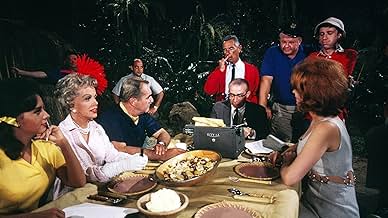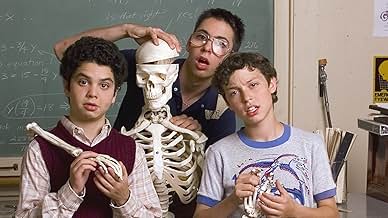Examines how sitcoms have evolved to reflect the changing face of American families.Examines how sitcoms have evolved to reflect the changing face of American families.Examines how sitcoms have evolved to reflect the changing face of American families.
- Awards
- 1 nomination total
Browse episodes
Featured reviews
I'm enjoying these episodes. I grew up watching many of these sitcoms and like hearing from the actors and others in the business how they lived or viewed them. Yes they touch on topics that were affected during those years and you may or may not agree with it but that's their history.
I would love to see a really good history of the sitcom without all the same players. Of course they were vital , but this series brushes over the 50's and naturally spends most of its time on I Love Lucy. So many other shows that could be explored. They drag Norman Lear, Suzanne Somers, Eric McCormick out to expound and naturally we once again visit, Maude, Good Times, Modern Family ad nauseam.
The sitcom is a special art, a half hour format whose style comes from that 2/ minutes of entertainment.
Sex and the City, Fleabag, and others mentioned are not sitcoms. This ruined the whole premise of the show. So far, very bored.
The sitcom is a special art, a half hour format whose style comes from that 2/ minutes of entertainment.
Sex and the City, Fleabag, and others mentioned are not sitcoms. This ruined the whole premise of the show. So far, very bored.
This is an excellent and thorough examination of many of the most popular sit-coms and how the medium - unique in its widespread influence - interacts with society. The episodes are watchable and light, due to the presentation consisting of quickly interspersed clips of the sitcoms themselves, news clips showing life outside the TV, and interviews with people who have devoted their entire lives to the industry (sometimes from childhood).
I appreciate how it looks at the whole history within each episode, focusing on a particular facet of society (family, work, sex, race, etc.). The viewer is able to join actors, writers, producers, and critics of the shows we've all grown up with and hear stories explaining how the paths of shows were forged and how current entertainment is related to the very different earliest shows of 70 years ago.
People who don't like the diversity being explored in society today - and therefore within up-to-date popular culture - might not appreciate the value of this. This documentary series is acknowledging the ways our world has changed, not politicizing (unlike many of the reviews listed here). It's a valuable contribution to the history of popular culture.
I appreciate how it looks at the whole history within each episode, focusing on a particular facet of society (family, work, sex, race, etc.). The viewer is able to join actors, writers, producers, and critics of the shows we've all grown up with and hear stories explaining how the paths of shows were forged and how current entertainment is related to the very different earliest shows of 70 years ago.
People who don't like the diversity being explored in society today - and therefore within up-to-date popular culture - might not appreciate the value of this. This documentary series is acknowledging the ways our world has changed, not politicizing (unlike many of the reviews listed here). It's a valuable contribution to the history of popular culture.
What should have been a fun and light hearted look back, with minimal social commentary sadly turned into a cringeworthy and often irrelevant , inaccurate over analysis that took all the air out of the balloon.
Rather too many people attempting to apply their on rather faulty and false social ethics to history that often simply made comedy for what it as, something to laugh at and with.
Many of these people had little or no direct involvement in the actual comedy creation process.
It seems as if CNN management sat round a table with a white board full of all the latest terms and words that had to be included in order to fulfil some false sense of diversity and wokeness.
But in the end, it delivered too much that made the viewer roll eyes, tut and sigh.
I tried so hard to look past the faux commentary and.enjoy reliving some moments from my past but the final straw came when Margaret Cho spoke of cultural appropriation and misogyny, not having a clue what each actually means and with such an airy tone that looked down upon the audience.
It is so ironic that what should be a celebration of comedy was too often used as an excuse to over analyse, make wholly subjective assumptions, presented as fact and completely forget the whole point of the exercise.
One of the frequent contributors was the editor in chief of the A. V. Club, that has a tagline 'Pop culture obsessives writing for the pop culture obsessed'.
Obsessed is correct but sadly, all the obsession has clouded the brain so much that the neurons cannot be seen for the grey matter.
Rather too many people attempting to apply their on rather faulty and false social ethics to history that often simply made comedy for what it as, something to laugh at and with.
Many of these people had little or no direct involvement in the actual comedy creation process.
It seems as if CNN management sat round a table with a white board full of all the latest terms and words that had to be included in order to fulfil some false sense of diversity and wokeness.
But in the end, it delivered too much that made the viewer roll eyes, tut and sigh.
I tried so hard to look past the faux commentary and.enjoy reliving some moments from my past but the final straw came when Margaret Cho spoke of cultural appropriation and misogyny, not having a clue what each actually means and with such an airy tone that looked down upon the audience.
It is so ironic that what should be a celebration of comedy was too often used as an excuse to over analyse, make wholly subjective assumptions, presented as fact and completely forget the whole point of the exercise.
One of the frequent contributors was the editor in chief of the A. V. Club, that has a tagline 'Pop culture obsessives writing for the pop culture obsessed'.
Obsessed is correct but sadly, all the obsession has clouded the brain so much that the neurons cannot be seen for the grey matter.
A pathetic, scary footnote for 2021 - So many of these comedians, notably Jerry Seinfeld et al, refuse to perform at any of today's college campuses because the students have lost their sense of humor. With so many social agendas, there are too many people that are sitting on the edge of the seat ready to be offended and attack.
Scary.
Scary.
Did you know
- ConnectionsReferenced in Late Night with Seth Meyers: Amy Poehler/Joseph Gordon-Levitt/Kevin Smith (2021)
- How many seasons does History of the Sitcom have?Powered by Alexa
Details
- Release date
- Country of origin
- Official site
- Language
- Also known as
- L'histoire des sitcoms
- Production company
- See more company credits at IMDbPro
Contribute to this page
Suggest an edit or add missing content
































